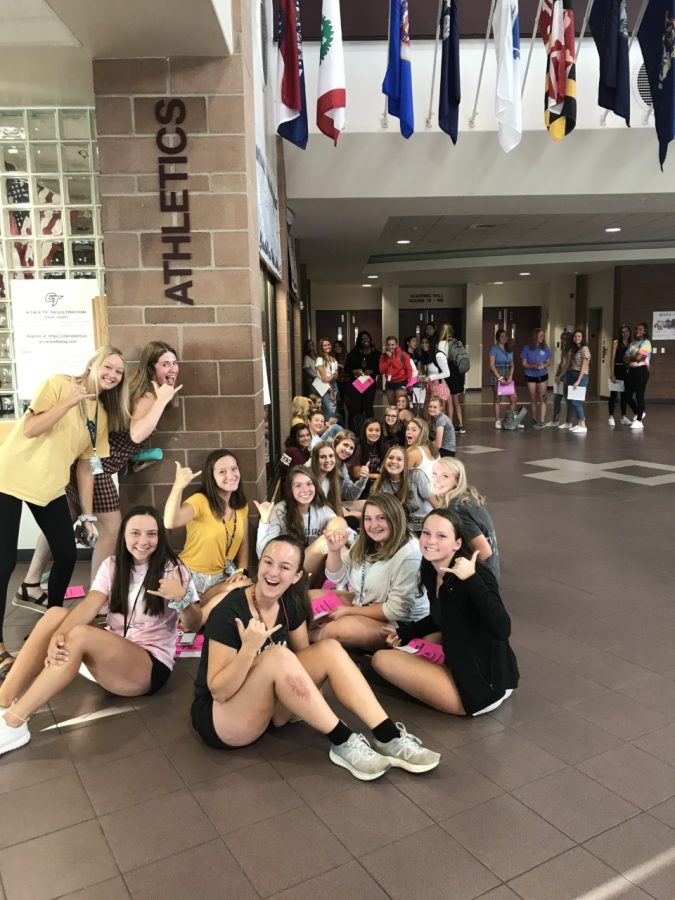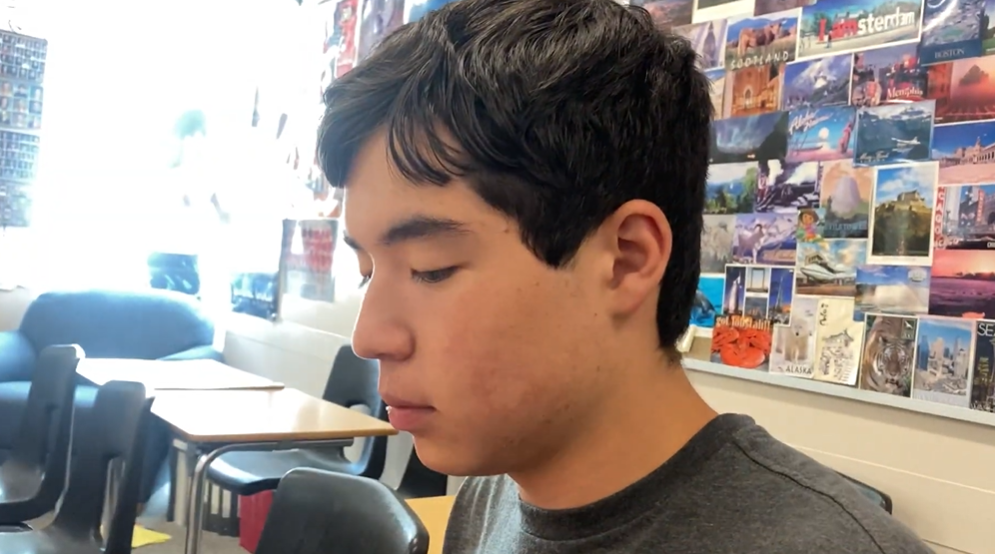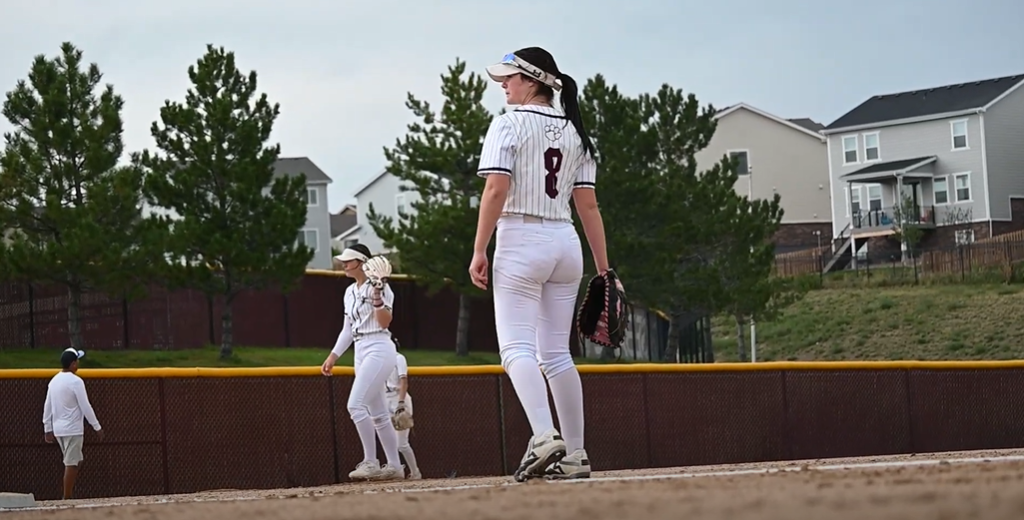Do It For The Cause: Powderpuff and All Its Triumphs and Flops
Powderpuff is arguably one of the most highly anticipated events of homecoming season, but is it only a novelty because it’s for a great cause or because girls are playing a guys’ sport? Players, committee leaders, and hopeful applicants all speak to Powderpuff’s relevance or perhaps lack thereof in an empowered time era, strengths, and weaknesses.
Grinning from ear to ear, hopeful junior Powderpuff applicants are camped outside the Athletics office, patiently waiting for the doors to open and their applications to play in the one-time fall event to be accepted. “It’s a fun way to get involved in school and something that’s competitive,” said Mia Thorn (11). “We typically get super caught up in winning, yet it’s for a greater cause, and it brings our school together during homecoming week.” Girls began filing in as early as 6:30 before school to secure their spot in line, following the application process’ accordance with “first come, first serve”. In past years, the Powderpuff theme has ranged from veterans to breast cancer support. Photo courtesy of Ms. Tammy Johnson
September 11, 2019
The crunch of turf.
The blurring collective face of the crowd.
The brush of fingers against the soft plastic grass.
The salty stain of sweat dripping.
The sway of flags dangling from a slim waist.
All of these peak in a crescendo to create a dull roar of athleticism and school spirit, blended into a single annual event dubbed Powderpuff. The match is a competition between senior and junior girls, lending the entire experience a lens of exclusivity. “Community,” Mia Thorn (11) said, of the nature of the two teams that go against each other at Legacy Stadium the week before Homecoming. “[Competitors] get to meet new people involved in Powderpuff and to be tired and bond over that together.” This year, Powderpuff will be held at Legacy on Oct. 2, the week of the Homecoming football game on Oct. 4 and the Homecoming dance on Oct. 5.
The game, a flag football match between the two grades, is played using flag football techniques, including the belts with the tags as well as a variety of rules, such as the fact that there are no kickoffs and the teams each have three plays to cross midfield. Powderpuff is coached by varsity football players, recommended by their own coaches. “Definitely getting to know more people and obviously winning,” Donovan Swift (12), varsity football player and Powderpuff coach, said of the hopes he has for this season’s match. “It’s going to be a lot more fun, but also serious, maybe more than actual football.”
Swift’s comment about the nature of football and how flag football isn’t “actual football” brings up a controversial debate about Powderpuff and its history of being overlooked as a direct result of girls being on the field, playing what is typically known as a guys’ sport, instead of men. “Girls really enforce it, but guys make it more of a sexist thing. And they like talking about how it’s so cute and how it’s a pink trophy,” Thorn said. “It’s gotten to an extreme point. Like how ‘frizzy’ it is…” Thorn argues that an unfortunate consequence of this gender discrimination, however unintentional it is, is that, “it creates a little bit of restriction and freedom for the girls on the team…”
Thorn isn’t the only girl pondering how Powderpuff differs from typical Friday night football. “I feel like boys football is always kind of a staple. Everyone likes to go to those games,” said Lindsey Fanning (12), head of Leadership’s Powderpuff committee. Fanning has taken the initiative to lead the planning on the entire event with five other Leadership students, with influence in every area of the game such as finding teacher referees and creating buzz for the event itself, as well as the tees and the campaign slogans. “But I do feel like when it comes to Powderpuff, it’s girls playing football.”
The inherent and underlying sexism isn’t the only thing that could be considered slightly controversial in Powderpuff’s constitution. The application to actually be in the game roster is hotly debated, with each girl having a seemingly different position. Many concerns have been aired in light of the recent application turn-in date on Aug. 20, such as the blunt and, according to some, concerningly short requirements for the application to be processed. “It shouldn’t just be like a first come first serve… They should include a paragraph and teacher recs on the application,” Trudi Paetzold (11) said. Paetzold’s name was featured on the roster as a result of her 6:45 AM venture to school to hold her place in line, but that didn’t stop her from voicing her opinion.
While Paetzold believes a more extensive written application process should be implemented, Thorn disagrees. “I think how we do with boys volleyball, how there are tryouts [should be the standard of acceptance] because not only boys sports are competitive, like this is something that’s competitive too,” Thorn said. “So we’re taking back politics of a girl sport, or out of a sport because it’s girls involved… We’re taking the athleticism out of it.” Thorn likened Powderpuff to the boys’ volleyball tournaments, played in the duration of Wish Week, in which varsity players from the girls’ volleyball team runs tryouts and manages the team.
Leadership, as planners and managers of the event, have received the brunt of all these varying opinions, as well as backlash from the female student body population. Committee members spend all of their Leadership class periods immersed in outlining every single detail, like the flowers and tee shirts as well as coaching, referring to the more vital details as “big rocks” and the less-necessary items as “little rocks”.
Out of all of their work, the Powderpuff application seems to be taking a lot of heat and members have similar reasons for the ways that they’ve chosen to execute the application process. “I think the way we have it is the most fair it can be,” Jeremiah Jordan (12) said, the co-head of Leadership’s Powderpuff committee. “Those first 25 that got in, they were the ones that want to play the most.”
Multiple members of the committee corroborate this, including de Vries and Fanning. “It’s been done several times, so I think they have a pretty good hang of it now about how the application process should go,” said de Vries. She processed junior applicants’ forms, finding herself faced with the impossible situation of having more friends wanting to play than there are spots on the team. Fanning and Jordan, the processors of senior applications, found themselves in the same difficult predicament. “It’s disappointing to see your friend or someone who’s really involved is number 42 and you know it’s probably not gonna happen for them. So it can be disappointing on both ends, but also excited to see the team come together,” Fanning said. Fanning was on the roster of the winning junior team last year and hopes to maintain Class of Vision’s winning streak this year as a part of the team against the Class of Summer.
While the application process has disputed cons, Fanning hopes that the idea of having the first 25 to 30 girls accepted will draw in more “worthy” applicants. “I definitely like to stick on people who are Cougar faithful, who show up to all of our events, who are leaders who stick up in the school,” said Fanning about the nature of an ideal applicant. She argues that acceptance to Powderpuff shouldn’t be based solely on the athletic spirit, but more on school spirit. “People that like genuinely want to be there rather than just like, hey, let’s do this. Genuine people who are genuinely excited.”
Paetzold backs this up, utilizing a different word than “genuine” to describe who should be playing. “Determined people should be the ones on the field,” said Paetzold.
Thorn adds on to these assertions by saying, “People aren’t doing it for the cause. They’re doing it to say that they did it right and they’re not really treating the game how it is.”
Leadership has experienced their fair share of frustrations with Powderpuff, namely the fact that applicants and other students are struggling with the idea of a fair application to all. The backlash they’re facing as a result of the “first-come, first-serve” rule has been swift and difficult to process. “It can be frustrating when people call the process not fair. It’s kind of frustrating to hear because of the negativity that comes from it,” said Fanning. “So this year, we’re really trying to spread positivity from it…We do make it fair.”
It’s not only the committee that the Powderpuff debate has reached within Leadership. Gabby Ello (12) talks about Powderpuff’s history and the struggles faced by the whole of the class. “Powderpuff started as a tradition a couple of years ago. The most frustrating thing for us was kind of building the hype around it and getting a lot of people to show up to the events. And really just spread awareness about our cause.”
One thing that Paetzold and de Vries share in common, besides their Cougar spirit and their commitment to Powderpuff, is their desire to get more people involved. De Vries adds that she would, “improve on celebration of the event…If you’re not a junior or senior, you don’t have a need to go to it. So I want to get the freshmen and sophomores interested in the event.” The Powderpuff game is high-spirited and fun, an environment of support and pride. De Vries and Fanning share the same view yet again. “I would love to have more girls in the field. 25 is hard… I would love to have everyone out there,” added Fanning about what she would love to see change someday. As the 2019-2020 Powderpuff application accepted 30 girls onto the roster, it looks like Fanning’s wishes are being heard.
A limitation to de Vries and Fanning’s wishes is the fact that advertisement of the actual event is less than boys’ football, or at least to Paetzold. “It’s underrepresented. It’s one day and … they should definitely make it bigger than they do… Unlike every other football game, it’s like a lot more down.”
This restriction on the hype of the Powderpuff game and following appearances during homecoming week, including on the Spirit Bus that takes some of the most spirited or involved students to local primary schools, can be frustrating for the actual organizers who’ve bled, sweated, and cried over this project. When prompted about what she would change leading up to the event, de Vries mentioned, “There’s a lot of stress, because we’re the ones running it. And we have to make sure that everything goes perfectly. And if it doesn’t, we have to figure out what to do and how to get it done quickly.”
Powderpuff. A word of feminine power, a word of discrimination, a silenced roar. The detail-oriented event and everyone involved, players and planners alike, unite for a greater cause on the field.
Don’t miss this year’s Powderpuff game, supporting breast cancer awareness and cure research, on Wednesday, Oct. 2.




